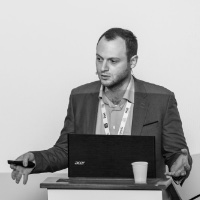DeepSec 2021 Talk: Post-quantum Encryption System for 5G – Maksim Iavich
Nowadays, many leading scientists and experts are actively working on the creation of quantum computers. On October 23 2019, Google announced that it has achieved quantum supremacy. This means the great speedup of the quantum processors compared to the fastest classic computer. On December 06 2020, scientists in China also announced that they also achieved quantum supremacy. Quantum computers will probably destroy most cryptosystems that are widely used in practice. A variety of “resistant to quantum attacks,” alternatives are developed. These alternatives are hash-based, code-based, lattice-based and multivariate crypto schemes. However, to date a number of successful attacks is recorded on the given system. It is also shown that these schemes have efficiency problems.
The amount of traffic carried over wireless networks and the number of mobile devices (including IoT) are growing rapidly and are being driven by many factors. The telecoms industry is undergoing a major transformation towards 5G networks in order to fulfill the needs of existing and emerging use cases. So the vision of 5G wireless networks lies in providing very high data rates and higher coverage through dense base station deployment with increased capacity, significantly better Quality of Service (QoS), and extremely low latency. To provide the necessary services envisioned by 5G, novel networking, service deployment, storage and processing technologies will be required. These technologies will bring new challenges for the 5G cybersecurity systems and its functionality. The 3rd Generation Partnership Project (3GPP) offers a standard for 5G networks. It contains the identity protection scheme, which addresses the important privacy problem of permanent subscriber-identity disclosure. This offer contains two stages: the identification stage, which is followed by providing the security context between service providers and mobile subscribers using the authenticated key agreement with the symmetric key. 3GPP offers to protect the identification stage by means of a public-key scheme. They offer to use Elliptic Curve Integrated Encryption Scheme (ECIES). The offered scheme is not secure against the attacks of quantum computers. It is important to integrate the quantum resistant scheme into 5G networks.
At DeepSec, the post-quantum encryption system, which will be secure against the attacks of quantum computers will be presented and analyzed. The methodology of integration of the encryption system into the identification stage of 5G will be shown. The implementation of the scheme will be explained.
We asked Maksim a few more questions about his talk.
Please tell us the top 5 facts about your talk.
- The amount of devices connected to the internet is increasing every day; 4G technology cannot handle so many devices. Therefore, it is obligatory to transfer to 5G.
- The researchers have identified the security problems of 5G; it is necessary to secure the 5G cellular network.
- The massive release of quantum computers is expected, quantum computers will be able to break almost all of the existing asymmetric crypto systems. Therefore, it is necessary to offer a system, which will be secure against the attacks of quantum computers.
- The encryption of data in 5G must be secure.
- It is important to integrate post-quantum encryption scheme into 5G.
How did you come up with it? Was there something like an initial spark that set your mind on creating this talk?
When working on creating the clever IDS for 5G networks in the frame of a local project, I have read standards for 5G networks. After analyzing this official documentation, I have identified that it offeres asymmetric elliptic curves encryption, which is not secure against the attacks of quantum computers. It is very important to focus the attention of the DeepSec participants on the migration of 5G to the post-quantum era.
Why do you think this is an important topic?
Quantum computers will be able to break almost all the existing asymmetric crypto systems. A large number of leading organizations, such as governments, banks, giant corporations, laboratories, different institutions or schools, rely on the asymmetric data encryption. Breaking the existing encryption systems will cause chaos.
Is there something you want everybody to know – some good advice for
our readers maybe?
Use only standard crypto libraries; don’t use the implemented crypto until it is standardized.
A prediction for the future – what do you think will be the next innovations or future downfalls when it comes to your field of expertise / the topic of your talk in particular?
Artificial intelligence can greatly help in the design of post-quantum crypto schemes.
 Maksim Iavich holds a PH.D. in mathematics and is a professor of computer science. He is the CEO & President of the Scientific Cyber Security Association (SCSA). Maksim is an affiliate professor and the head of the cyber security division at Caucasus University. Maksim is a cyber security consultant for Georgian and international organizations. He speaks at international cyber security conferences and is the organizer of many scientific cyber security events. He has many scientific awards in the cyber security field. Maksim is the author of many scientific papers. The topics of the papers are cyber security, cryptography, post-quantum cryptography, quantum cryptography, 5G security, mathematical models and simulations.
Maksim Iavich holds a PH.D. in mathematics and is a professor of computer science. He is the CEO & President of the Scientific Cyber Security Association (SCSA). Maksim is an affiliate professor and the head of the cyber security division at Caucasus University. Maksim is a cyber security consultant for Georgian and international organizations. He speaks at international cyber security conferences and is the organizer of many scientific cyber security events. He has many scientific awards in the cyber security field. Maksim is the author of many scientific papers. The topics of the papers are cyber security, cryptography, post-quantum cryptography, quantum cryptography, 5G security, mathematical models and simulations.
